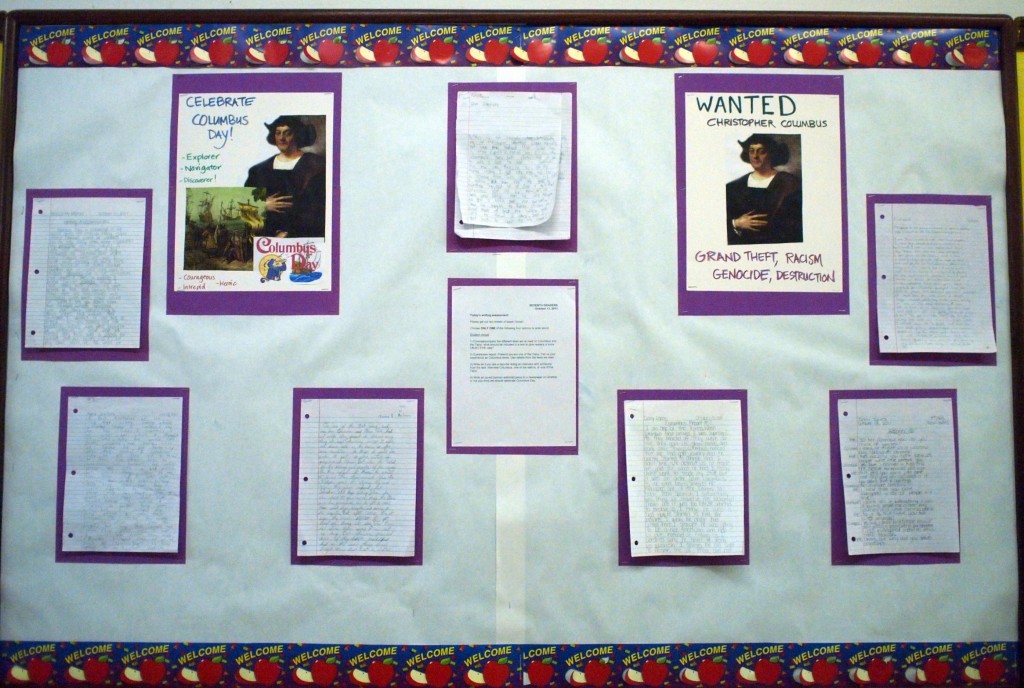7th Grade SS
In this section, you will find examples of my fall 2011 student teaching in a seventh grade social studies classroom: 1) the teaching rationale behind our Age of Exploration unit along with some examples of student projects and my own work; and 2) some examples of assessment modifications I worked on for my students with IEPs.
Age of Exploration Unit
The Age of Exploration was one of the things the students and I studied during fall 2011. We looked at it from the critical viewpoint of perspective, asking ourselves with every story: “Whose voice is missing? Whose perspective is not shown in this version of the story? And what inferences can we make based on that about the author’s viewpoint?” I want my students to be able to recognize when what appears to be an objective text is actually just a reiteration of the majority story.
Our first unit in this overarching theme started with some pre-Columbus events and went up through Magellan, Balboa, Cabot and Verazzano. After this we transitioned into a unit titled Exploration via Colonization (beginning with Cortes and Pizarro and going up to the 13 Colonies).
Strug Unit Intro–Age of Exploration: Whose voice is missing?
Martha Nussbaum’s book Cultivating Humanity provided a guided idea for me as the teacher of this unit. She points out that in order to be a good (humane) citizen and make the right choices, you must have narrative imagination: “the ability to think what it might be like to be in the shoes of a person different from oneself, to be an intelligent reader of that person’s story and to understand the emotions and wishes and desires that someone so placed might have.†[emphasis added] What can we learn by putting ourselves in another person’s shoes? Can we understand their choices? Could we find it in ourselves to make different ones if we were in the same situation? We need to know who we are and where we came from; but we need to examine that as critical enquirers and not merely accept the story as it is handed to us.
History is everyone’s story—everyone’s view should be represented.
We studied the concept of perspective, the difference between objective and subjective, as well as taking a look at perspective from a geographic standpoint (the world as Columbus knew it), and from a chronological standpoint (what was happening when / where). We worked on literacy strategies during this unit as well, particularly focusing on QAR–Question Answer Relationship.
We took a critical look at two different perspectives on Columbus: hero or villain?
My students compared and contrasted the different texts we read. Student Comparison of Two Columbus Texts
They considered what Columbus’ arrival was like from the Taino point of view. Student Interpretation of Taino Perspective
They interviewed Columbus. Student Interview of Columbus
And they pondered whether or not Columbus Day should be celebrated as a national holiday. Student Perspective on Columbus Day Celebrations
We used a variety of means to further our knowledge and expand our understanding, including short-answer vocabulary quizzes, entrance and exit statements, jeopardy games (using our social studies content), and students answered focus questions about the content every day in their logs. Later in the unit, they compared Columbus and Magellan, some using a traditional non-fiction compare/contrast stance and others using a fictional narrative, writing as Magellan about to set out on his journey after having read Columbus’ journals.
Putting Differentiation into Practice
One of my goals during student teaching was to successfully put into practice differentiation for students with special needs. I worked with the special ed teacher to further define what I wanted my students with IEPs to understand and how I could help them access grade-level content in a more scaffolded way. The school at which I student taught practices inclusion so I worked on different strategies to scaffold these students both in daily instruction and on assessments as well. Here are a few examples of differentiated assessments I prepared for them.
Strug Quiz with Accommodations
Strug Essay Writing Prompt with Accommodations


